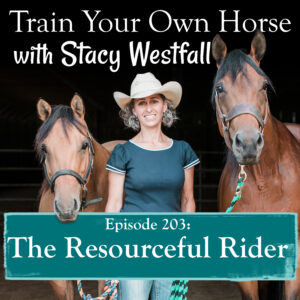Episode 203: The Resourceful Rider

Are you a Resourceful Rider?
Examples of resourcefulness include:
1-Being strategic about how you leverage your resources;
2-Not wasting time and money;
3-Getting the best out of what you have;
4-Being flexible and adaptable;
5-Thinking outside the box;
6-Being willing to learn new skills or develop existing ones when necessary.
Listen now hear specific horseback riding examples of each of these.
Being resourceful is a skill that can be learned, practiced and enjoyed. It can help you achieve things you didn’t think were possible…until you looked at it from a different view.
⬇️FULL SHOW NOTES
CLICK FULL SHOW NOTES
Links mentioned in podcast:
Do you want to take the concepts that you are learning on the podcast to a deeper level? Come join me: Click here to learn more.
SUBSCRIBE TO THE PODCAST HERE:





YOURS FREE
WHY IS MY HORSE...?

